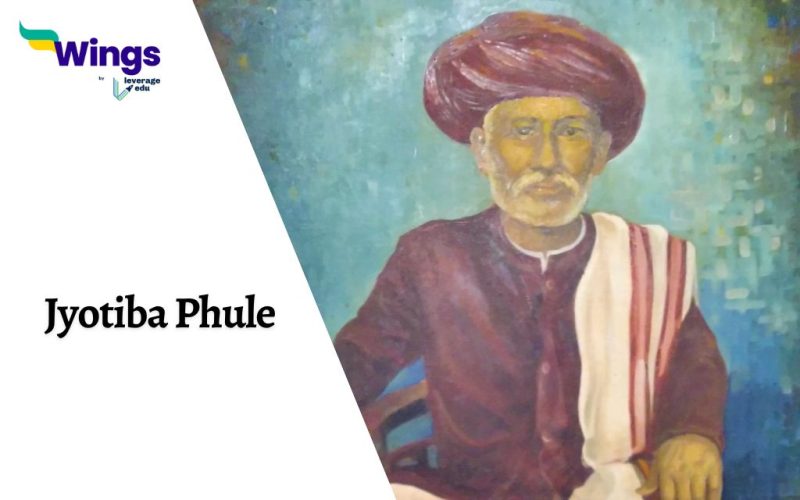A social reformist, activist, writer, and thinker, Jyotirao “Jyotiba” Govindrao Phule or Mahatma Phule is remembered for the socio-cultural reforms he brought to India during the 19th century. He became the leading voice against India’s widespread caste system. Phule revolted against the Brahmins’ rule and was a stern advocate for the rights of peasants and other people belonging to the lower castes. In this article, we will go through the biography of Jyotiba Phule, including his life, death, and the social reforms that he brought.
Table of Contents
Who was Jyotiba Phule?
Jyotiba Phule carried out many social reforms related to the Brahminical order and promoted caste equality. He was a staunch opponent of the rules of pollution and purity. In the year 1888, a social activist from Maharashtra, Vithalrao Krishnaji Vandekar honoured Jyotirao Phule with the title of Mahatma, meaning a person who is held in high esteem for their wisdom. Apart from this, Jyotiba Phule also worked against Gender discrimination.
Jyotiba Phule Life and Biography
Phule was born in the year 1827 in Maharashtra’s Satara district. His family belonged to the “mali” caste and was seen as socially backwards in the Brahminical order. The family adopted their last name as ‘Phule’ as Jyotirao’s father and uncles worked as florists. As for Jyotirao’s mother, she died when he was just nine months old.
Jyotirao was an intelligent student but had to give up on his education because of the dire financial condition of his family. He eventually started to help his father on the farm, but when a neighbour saw the potential that Phule had, he encouraged his father to enrol him in a school. He was then enrolled in the Scottish Mission High School in Poona and graduated in 1847. Jyotirba got married to Savitribai at the age of thirteen.
Also Read: The Saga of Savitribai Phule, India’s First Lady Teacher
Following were the political and social contributions of Jyotiba Phule:
- He was ever so critical of the Indian National Congress for their neglect towards the lower casts of society
- He was appointed commissioner to the Poona municipality and served in the position till the year 1883.
- He became the first person to start a school for the “untouchables” in the year 1854. In 1851, he and his wife Savitribai started a girls school.
- He was a pioneer of the widow remarriage movement in Maharashtra.
- He urged the government to impart compulsory education to the masses.
- He started the Satyashodak Samaj in the year 1873.
Jyotiba Phule and Satya Shodhak Samaj
Jyotirao Phule was the founder of Satyashodak Samaj, whose primary motive was to seek the truth and promote caste equality. Satyashodak Samaj was established in the year 1873. Its aim was to secure human rights and social justice for the backward casts.
Phule carried out a methodical deconstruction of historical beliefs and ideas from which he established and rebuilt one that promoted equality.
He gained information from a number of ancient texts and scrutinized the origins of Bhraminism while accusing it of using exploitative measures to maintain social supremacy. The “Satya Shodhak Samaj” had approximately 316 members till the year 1876.
Also Read: Widow Remarriage Act: Provisions, History
Important Facts about Jyotiba Phule (Compiled)
Following are some of the important facts that you must know about Jyotirao Phule:
- He started the Satyashodak Samaj in the year 1873 which promoted caste equality.
- He wrote a number of books including Gulamgin in the year 1873 where he elaborated his views on the historical roots of shudras
- He became the first person to start a school for the “untouchables” in the year 1854. In 1851, he and his wife Savitribai Phule started a girl’s school.
- He also wrote in the Marathi language a journal named “Deen Bandhu”
- In the year 1888, a social activist from Maharashtra, Vithalrao Krishnaji Vandekar honoured Jyotirao Phule with the title of Mahatma.
- He was the forerunner of awareness campaigns that inspired individuals like Mahatma Gandhi and Dr B.R. Ambedkar who subsequently carried out significant operations to end caste discrimination.
Jyotiba Phule Books
The literary contribution of Jyotiba Phule is tremendous and has influenced people for generations. Here are some of the books written by Jyotiba Phule –
- Shetkarayacha Aasud (Cultivator’s Whipcord)
- Shatkarayacha Asudh Part II
- Gulmagiri (Slavery)
- Satyashodhak Samajachi Vangmayavali (Satyashodhak Samaj collection)
- Trutyache Bhashan (Speech on the Plaque)
FAQs
He led a movement in India that called for the creation of a new social order in which no one would be subordinate to the upper-caste Brahmans.
A social activist from Maharashtra, Vithalrao Krishnaji Vandekar honoured Jyotirao Phule with the title of Mahatma in the year 1888.
Savitribai Phule was the wife of Jyotiba Phule.
Relevant Blogs
| Henry Vivian Derozio | Ishwar Chandra Vidyasagar |
| Indira Gandhi | Swaraj Party |
| Peasant Movements | Kiran Bedi |
| Prarthana Samaj | Arya Samaj |
| Bengal Partition | Birsa Munda |
That is all about Jyotiba Phule. If you want to know more information like this then you can read our blog on basic general knowledge for competitive exams. You can also connect with our study abroad experts if you want to get admission in your dream university!
 One app for all your study abroad needs
One app for all your study abroad needs













